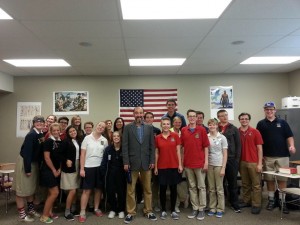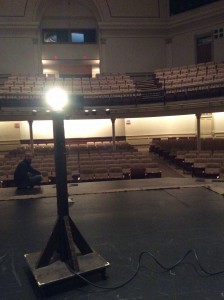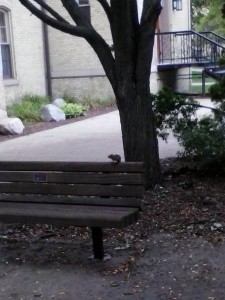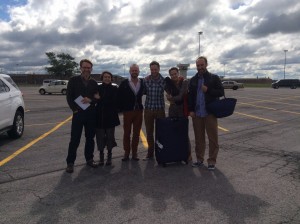On a sweltering Tuesday morning, myself and Jack Whitam trundled up to the campus at Brigham Young University to tech into the outdoor space. The first thing we had to do was get them to move all the seats about four foot closer to the stage, as they were laid out as if we were there to play a pop concert. That done, I wandered off into the campus to get myself a coffee. Two hours later, shaking with deprivation, it finally occurred to me that the Mormons don’t touch caffeine and this being a Mormon campus there was no coffee to be had. A campus without coffee. Hard to imagine, but there it is.
Our first night was sold out and we played in the calm warm evening to a lovely generous crowd. The second night they had brought in loads more chairs, and without any warning we found ourselves playing more or less completely in the round. Lovely to feel sought after like that. And fascinating to be forced to take in such a wide audience having built the show with an end on crowd in mind. The clouds were louring upon us though, and sure enough as the first half drew to a close the opening drops of a full on downpour were just beginning to pitterpatter onto our noses. The floodlights they had rented for us were the kind that explode when wet, so it made sense to move indoors. We were thrown into the second half end on in an unfamiliar theatre, contemplating a completely full house and a different acoustic. Of course we smashed it, and for the first time in America they forced us back on for an extra bow. All this enthusiasm is too much for our English brains to compute. But it’s certainly delightful. And by the time we had finished the last matinee on Saturday, sold out again, we were all a little bit in love with the Mormons.
Owing to the magic of social media, a man who I occasionally geek out about Homer with on twitter invited me to speak to his class about Shakespeare. So I found myself at Karl G Maeser prep school, talking to a class full of smart and enthusiastic kids. At the end one of the teachers said “Show us some of your quality.” A little confrontational, I thought, but ok. Fine. Being a geek and fond of adrenaline I said “Which play do you want me to do a bit from then?” DangerAl. He could’ve stitched me up by saying Timon of Athens. But he said Merchant of Venice. SCORE. I could then cheekily ask, “Do you want a prose speech or a verse speech?” He said prose. I did about half of the old Shylock “if you prick us”, although I forgot a chunk. Then full of adrenaline I said “I’ll do a verse one too from the same play, and then smashed Shylock’s long response to Antonio on the Rialto. Being a geek is handy sometimes. Here we all are after the lesson. I disguised myself as an academic.
The teacher that put me on the spot is so fond of Shakespeare he had a Shakespeare tie, a Shakespeare shirt, and an array of Shakespeare badges. Another academic I met later at Brigham Young said “I like to call him Bill.” I almost responded with ” I think the evidence points to him preferring to be called Will, actually, hem hem”. I managed to stop myself by the skin of my teeth, so am saying it here instead. But generally, they love Shakespeare in Utah. There’s a Shakespeare festival, a replica Elizabethan theatre down south, and someone even thrusting some copies of their play “Much Ado About Love” into my hands after a show. It calls itself “A romantic comedy in Shakespeare’s verse.” A Frankenspeare’s monster of a play. We are going to read it later. Actually it seems rather lovely. (Edit: Having read it now, it is an extraordinary labour of love.)
I did the bulk of my teaching on the final day, running some voice classes with the acting students, and trying to give them a simple basis of connection with the breath through text use. They were smart and responsive, and brave. This is the first time AFTLS has been to Brigham Young, but if this visit is anything to go by, it won’t be the last. And it’s been the perfect friendly start to our touring section. Next week, University of Texas, San Antonio, October the 1st, 3rd and 4th at 7.30 in the Recital Hall.
(And because I grew up in the nineties, I give you the hilarious mawkish dance track that has been on my mind the whole week, by Utah Saints. Who are from Harrogate, Yorkshire: http://youtu.be/XF4EJvfNQcs )






